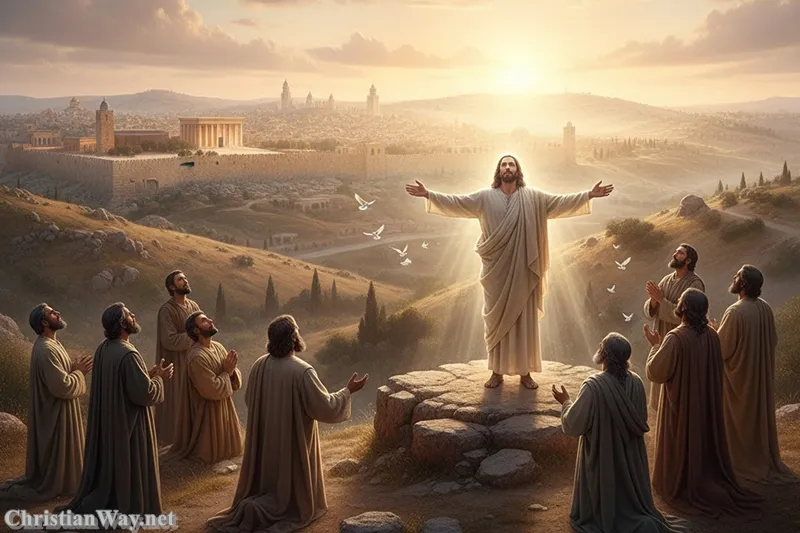Every human heart, at some point, asks the most profound of all questions: Who is Jesus Christ?
For some, He is a figure from history — a wise teacher, a prophet, or a symbol of love. For others, He is the mysterious center of faith, the name that stirs both devotion and wonder. But for those who have encountered Him in faith, the Lord Jesus Christ is not merely an idea — He is the very face of God’s mercy, the Word made flesh, who entered our world to bring us back to the Father.
Dear friends in Christ, to speak of the Lord Jesus Christ is to speak of love itself. In Him, the invisible God became visible. In His eyes, we see compassion. In His words, we hear truth. In His wounds, we find healing. And in His resurrection, we behold hope that cannot die.

Let us journey together through the mystery of Christ’s love — the love that took on flesh, walked among us, suffered for us, and rose to bring us eternal life.
The Mystery of the Incarnation: God Made Visible in Jesus Christ
The story of salvation begins with a promise — a divine longing to restore what sin had broken. Humanity, created in God’s image, had fallen far from grace. Yet God, who is love, could not abandon His creation. The prophets spoke of a Redeemer to come, one who would bear our sorrows and restore our peace.
In the fullness of time, this promise was fulfilled in Jesus Christ, born of the Virgin Mary, conceived by the Holy Spirit. As the Gospel of John declares:
“And the Word became flesh and dwelt among us, and we have seen His glory, the glory as of the only Son from the Father, full of grace and truth.” (John 1:14)
This is the heart of Christian faith: the Lord Jesus Christ is not merely a messenger of God — He is God Himself, dwelling among us. He is the eternal Word, through whom all things were made, entering the story of His own creation to redeem it from within.
In Bethlehem, the infinite became small. The Creator entered His creation not in power but in humility. The Lord of heaven was laid in a manger, held in the arms of His mother, adored by shepherds and angels alike.
The Humility of Divine Love
What kind of love would leave the glory of heaven to share our poverty? Only divine love — a love that bends down, that seeks the lost, that refuses to remain distant. The Incarnation is not merely a doctrine; it is the miracle of God’s heart revealed.
Saint Augustine once said: “Man’s maker was made man, that He, Ruler of the stars, might nurse at His mother’s breast.”
Every act of Christ’s earthly life — His birth, His ministry, His suffering — reveals what divine love looks like when it touches human life.
The Ministry of Christ: Healing, Teaching, and the Call to Conversion
When the Lord Jesus Christ walked the dusty roads of Galilee and Judea, He did more than perform miracles. Every healing, every parable, every act of mercy was a window into the heart of God.
He spoke words that set captives free, that comforted the weary, that invited sinners to begin again. To those who were broken, He said, “Your sins are forgiven.” To those in despair, He said, “Be not afraid.”
The Gospels show us not a distant teacher but a compassionate Savior who sees each soul with perfect love. He ate with tax collectors and sinners, touched lepers without fear, and restored sight to the blind. Each act was a proclamation that God’s kingdom is not for the righteous alone, but for all who turn their hearts toward mercy.
The Beatitudes: The Heart of the Kingdom
Perhaps nowhere is the love of Jesus Christ more radiant than in the Sermon on the Mount. There, He revealed the inner law of the kingdom — a law written not on tablets of stone but upon the human heart:
“Blessed are the poor in spirit, for theirs is the kingdom of heaven… Blessed are the merciful, for they shall obtain mercy… Blessed are the pure in heart, for they shall see God.” (Matthew 5:3–8)
In these words, the Lord unveils a new vision of life — one rooted not in power or pride, but in humility and love. He calls us not simply to obey, but to become like Him: merciful, forgiving, self-giving.
The Passion of the Lord Jesus Christ: Love That Bears the Cross
If the Incarnation shows us how far God will come to reach us, the Cross shows us how far He will go to save us.
On Calvary, the Lord Jesus Christ bore the full weight of human sin. Betrayed by friends, condemned unjustly, crowned with thorns, and nailed to the Cross, He revealed the depth of divine love in the language of suffering.
Saint Paul writes,
“God demonstrates His own love for us in this: while we were still sinners, Christ died for us.” (Romans 5:8)
At the Cross, sin and mercy meet. Justice and compassion embrace. The One who had no sin became sin for us, that we might become the righteousness of God (2 Corinthians 5:21).
The Silence of the Cross
In the agony of Good Friday, when the Lord cried out, “My God, my God, why have You forsaken Me?”, He entered into the darkest corners of human despair — not as a distant observer, but as one who suffers with us.
His silence is not abandonment, but solidarity. He has entered into every human cry, every loneliness, every fear. From the Cross, He speaks the word of forgiveness: “Father, forgive them, for they know not what they do.”
This is the love that changes everything — a love that does not demand repayment, but offers redemption.
The Resurrection: Love Stronger Than Death
But love could not die. The tomb could not hold the Lord of life.
On the third day, the stone was rolled away, and Jesus Christ rose from the dead, triumphant over sin and death. His wounds, once marks of suffering, became radiant signs of victory.
When the Risen Christ appeared to His disciples, He did not come in wrath, but in peace. “Peace be with you,” He said, showing them His hands and His side (John 20:19–20). In that moment, their fear turned to joy, and despair was swallowed by hope.
The Resurrection is not merely an event of the past; it is the living heart of our faith. The same Lord who rose in glory now reigns forever, offering new life to all who believe.
The Lord Who Walks Beside Us
Even now, the Risen Lord walks with us — often unrecognized, as He did with the disciples on the road to Emmaus. He speaks through Scripture, He is present in the Eucharist, and He reveals Himself in the love of His people.
When we suffer, when we doubt, when we long for meaning — it is Christ who draws near, whispering, “Do not be afraid; it is I.”
The Lord Jesus Christ is not a memory. He is a living presence. His love continues to transform hearts, heal wounds, and bring light to the world’s darkness.
The Lordship of Christ: The King Who Serves
To call Him “Lord” is not merely a title of reverence; it is a confession of faith.
The early Christians proclaimed, “Jesus Christ is Lord,” even when it meant persecution or death. In those words lies the deepest truth of existence — that all creation finds its meaning in Him.
“Therefore God has highly exalted Him and bestowed on Him the name that is above every name, so that at the name of Jesus every knee should bow… and every tongue confess that Jesus Christ is Lord.” (Philippians 2:9–11)
Yet the Lordship of Christ is not like worldly power. His throne is the Cross. His crown is of thorns. His scepter is love.
He reigns not by domination, but by service; not by force, but by forgiveness.
The Kingdom of the Heart
Christ’s kingdom begins not in palaces or parliaments, but within the human heart. When we surrender our pride, forgive our enemies, and live in mercy, we allow His reign of peace to begin in us.
Every time we love the poor, welcome the stranger, or choose compassion over judgment, we proclaim the living kingdom of the Lord Jesus Christ.
The Presence of the Lord Today: Christ in His Church
Even after His Ascension, the Lord did not leave us orphans. He remains with us in His Spirit, in His Word, and above all, in the Sacraments.
In Baptism, we are united to His death and resurrection. In the Eucharist, we receive His Body and Blood — not as symbol, but as true communion with the living Christ.
When the priest raises the host and says, “Behold the Lamb of God,” we see before us the same Lord who walked in Galilee, who was crucified and is risen. The Lord Jesus Christ continues to feed His people with the Bread of Life, nourishing our souls for the journey to heaven.
Christ in the Poor and the Suffering
The Lord also hides Himself in those who suffer. He said, “Whatever you did for one of the least of these brothers and sisters of mine, you did for Me.” (Matthew 25:40)
To love Christ, then, is to love the hungry, the sick, the lonely, and the forgotten. To serve them is to meet Him face to face.
The Call to Follow the Lord Jesus Christ
Every encounter with Jesus Christ demands a response. He does not merely ask us to admire Him — He calls us to follow Him.
To follow Christ is to take up the Cross daily, to walk the narrow path of love and truth. It means forgiving as we have been forgiven, loving as we have been loved, serving as we have been served.
This path is not easy, but it is full of joy. As Christ Himself said:
“Whoever loses his life for My sake will find it.” (Matthew 16:25)
To know Christ is to know life — not just life after death, but the fullness of life here and now.
Reflect and Pray
In the Lord Jesus Christ, we behold the very heart of God. His love is not distant or abstract, but personal and near. It meets us in our weakness, lifts us in our sorrow, and transforms our lives with grace.
He is the image of the invisible God, the Word made flesh, the Lamb who was slain and lives forever. To gaze upon His face is to see the love that created the universe — and the love that will never let us go.
Let us, then, open our hearts to His presence, not just in church or prayer, but in every moment of life. Let us carry His peace into a world that hungers for meaning, and reflect His mercy in our homes, our work, and our relationships.
“May the Lord Jesus Christ Himself, and God our Father, who loved us and gave us eternal comfort and good hope through grace, comfort your hearts and strengthen them in every good work and word.” (2 Thessalonians 2:16–17)
May the peace of the Lord Jesus Christ dwell richly in your heart, and may His love guide every step you take toward Him.
— Fr. John Matthew, for Christian Way





